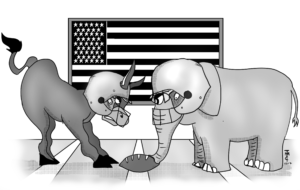Illustration by Tyler Carpenter
On the heels of the divisive presidential election, the current political climate has fostered discussion and drawn reaction from the sports world in a way unseen in a long time. When today’s athletes choose to speak out, they are entering a raging maelstrom where society can no longer even agree on what the facts are.
It has left many athletes and coaches speaking up on matters in which they disagree with President Donald Trump or players showing their support for their beliefs through actions on the field. Golden State Warriors coach Steve Kerr has spoken out on political issues, as has San Antonio Spurs coach Gregg Popovich.
Kerr voiced his support of All-Star and two-time MVP Stephen Curry’s response to his chief sponsor’s comments about the president. Kerr’s message to his team is straightforward: If you’re passionate about a subject, and more importantly, you are well-read on it, then don’t be afraid to voice your opinion, even if is unpopular.
Six members of the Super Bowl-winning New England Patriots have said they will not attend the customary visit to the White House citing various reasons including political differences with the president.
San Francisco 49ers quarterback Colin Kaepernick kneeled during the national anthem because he believes that the anthem represents a country that oppresses people of color. Several other players around the league joined him in kneeling, raising a fist, or another form of expression during the national anthem.
Last July, LeBron James, with a trio of other NBA stars, implored fellow professional athletes to educate themselves with the issues facing America and to use their platform for activism. Some fans, though, continue to hold strong to the “stick to sports” mantra in the polarized political landscape.
Should student-athletes be expected to voice their support and beliefs for social issues as James has asked of professional athletes? How well read should collegiate athletes be expected to be on social issues?
College is a time for ideas to be developed and opinions formed. Generally, professionals have the advantage of being older and have more life experience to draw upon. Student-athletes also have the right to use their platform to stand up for what they believe, even if those ideas are fluid.
The added dimension of political statements and activism in college sporting events would raise community interest and provoke the type of conversations our respective communities need to have. Such public discourse will have a greater impact if the athletes have studied the issue and used reliable sources. If they do not, then they will embarrass both themselves and the university. Instead of sparking intelligent dialog, they will simply become one of the chorus of uninformed voices.
Athletes are popular figures around campus and receive more attention than typical students. As they become informed and take stands on issues facing the community, hopefully other students will follow suit.











This is the best writing I have seen in a long time. Ty Bianucci is what the media is lacking and everything they should be. I would carry his child